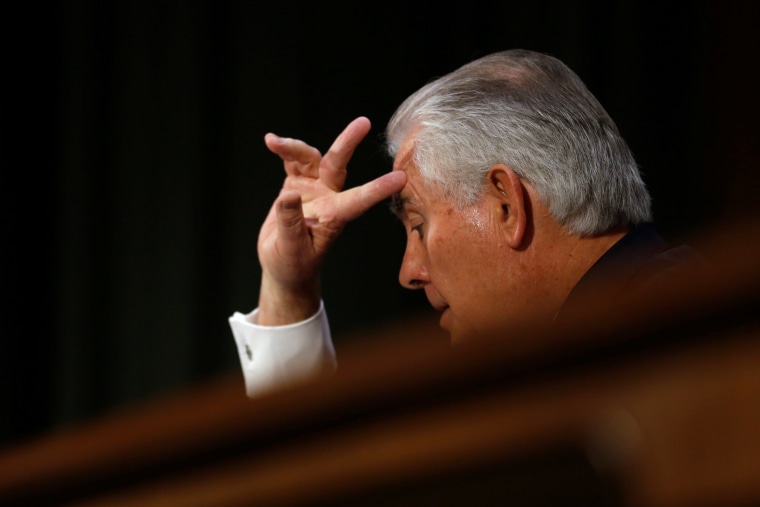Right about now, it's likely that international officials are watching the Trump administration closely, paying careful attention to its rhetoric, and trying to get a firm grip on exactly what this White House's position is on foreign policy and national security, especially as it relates to North Korea.
Yeah, good luck with that.
Yesterday, Donald Trump said if North Korea makes "more threats" towards the United States, the American president will subject the country to "fire and fury like the world has never seen." This morning, Trump's chief diplomat took a very different posture.
As President Donald Trump and North Korean dictator Kim Jong Un trade increasingly fiery threats, a far more measured tone came from Secretary of State Rex Tillerson, who said he saw no imminent threat."I think Americans should sleep well at night," Tillerson said Wednesday during a refueling stop on his way back to Washington, D.C. "I have no concerns about this particular rhetoric over the last few days."
Even as Trump continued to use his Twitter account this morning for saber-rattling, Tillerson insisted there's no "imminent threat."
OK, so the president drew a bright red line yesterday, which the secretary of state seems eager to erase. That mixed message is likely to cause some confusion about the official U.S. position, but it was made more complicated this morning by Sebastian Gorka, a top White House adviser on national security, who told Fox News, "This is analogous to the Cuban missile crisis."
Gorka, who said all Americans now have a responsibility to "come together" in support of Trump, added, "[The president is] saying, 'Don't test America, and don't test Donald J. Trump.' We are not just a superpower. We were a superpower. We are now a hyperpower. Nobody in the world, especially not North Korea, comes close to challenging our military capabilities. Whether they're conventional, whether they're nuclear or whether they're special forces. So the message is very clear: Don't test this White House, Pyongyang."
One need not be an expert in international affairs to note that Tillerson and Gorka took two very different messages to the public this morning.
And what's striking is how routine this has become. We talked last week, for example, about the competing messages from Trump World about whether or not the administration would engage North Korea diplomatically, with Trump and Tillerson opening the door to talks, while U.S. Ambassador to the United Nations Nikki Haley and Vice President Mike Pence saying largely the opposite.
As Rachel noted on last night's show, Tillerson has taken two different positions on what North Korea would have to do in order for the administration to consider negotiations.
We're left with an untenable dynamic. Confronted with a burgeoning nuclear crisis, what's the Trump administration's position on North Korea? It apparently depends on the day -- and which administration official one chooses to believe.
Responding to a reporter's question at a White House event last week, the president said, "We'll handle North Korea. We're going to be able to handle them. It will be handled. We handle everything."
I have a hard time believing anyone can take such assurances seriously.
